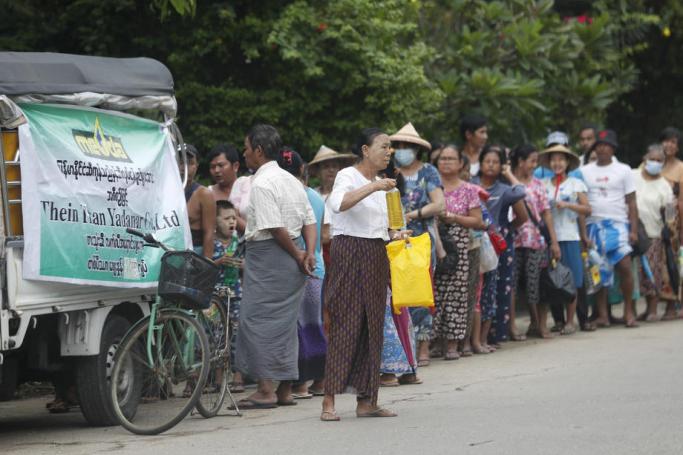In Yangon, every day, crowds of people wait in line at places where food is distributed freely and basic food items such as edible palm oil are discounted.
Even during the rainy season, people on low incomes are waiting and enduring continuous rain to reduce their daily food expenses.
Following the military junta’s excessive control over the use and exchange of US dollars, the Myanmar Kyat has dropped to its lowest value which has led to a rise in commodity prices and reduced incomes. As a result, people are facing so many difficulties that they require humanitarian assistance.
Ramanathan Balakrishnan, the acting UN Resident Coordinator and Humanitarian Coordinator, stated on 19 August that 1.2 million people in Myanmar have fled their homes due to ongoing conflicts.
He claimed that more than 3 million affected people were receiving help from donors and funding from local and international organisations. Inflation and rising poverty have also increased the need for assistance in war zones as well as in the areas surrounding towns.
People have been badly affected by higher commodity prices. They have to be more frugal than before. In addition, people are reporting that their expenses are higher than their incomes due to skyrocketing general commodity prices.
Under the military junta, civilians are in need of humanitarian aid more than ever due to the economic recession. This can be seen in the long queues of people waiting for donated or discounted food.
The monks from Thayettaw Monestry, located on BoGyoke St., Lanmadaw Township, Yangon, used to re-donate their leftover food to beggars and the poor. Currently, they are also donating to ordinary middle-class people on low incomes. Previously, in July 2021, the monks were sharing out their leftover food to five or 10 people, now they are trying to feed 400 to 500 people who do not have enough food to survive.
In some townships, there are crowds of people queuing up for edible palm oil sold by the Myanmar Edible Oil Dealers’ Association at 4000 Kyat per Viss (approximately 1.63 kilograms).
In addition to controlling the dollar, the junta limited the import of primary food items such as edible palm oil. There was an announcement that companies with licenses for importing, storing, and selling palm oil would have them terminated if they did not comply with the junta's rules. In the foreign market, the price of palm oil is about 9,000 – 10,000 Kyat per Viss.
An anonymous housewife living in Tharketa Township, Yangon, said: “We have to be very economical at this time and we need to prioritise what we need over what we want. Before, our salaries were barely enough. As the commodity prices have risen we are having to pay two or three times more for an item – it is very difficult to even maintain a balance between income and expenses.
Now that palm oil is being sold at a lower price in Tharketa, I queued up to buy it to use in cooking meals.
“At other places, the price of edible oil has risen to such high prices that we can’t afford to buy it anymore. There is only one person who is working in my family. I need to queue at places where food is donated at the end of the month.”
Since May 2021, the UN World Food Programme (WFP) has tried to address the critical food needs of vulnerable people living just outside Yangon and Mandalay who have been impacted by the triple shock of the socio-economic impact of COVID-19; the political crisis; and underlying poverty.
In the first six months of 2022 the WFP provided assistance to 2.4 million people in Myanmar.
Stephen Andersen the WFP Country Director for Myanmar said that the WFP is doing its best to advocate for unfettered humanitarian access to all those in need.
“It is important that all concerned actors understand humanitarian aid as a pathway to peace and stability. Our beneficiaries mainly include food insecure people from informal settlements including children, women, elderly people, and people with disabilities.
“WFP is reviewing various possibilities of continuing support for the most vulnerable people in Yangon taking into account needs, capacities, resources, and complementarity with other aid actors on the ground”, he said.
Ramanathan Balakrishnan, from the UN said on August 19, World Humanitarian Day, that “humanitarian workers in Myanmar must be allowed to do their jobs free from restrictions and harassment.” He also called for “an end to the unrelenting violence that is terrifying communities.”
He said that there are “debilitating bureaucratic constraints” to getting aid into Myanmar and that “Expanded humanitarian access, especially to conflict-affected areas, is vital and negotiations to secure this access should never be politicized or made transactional.”












